Discussing the Mafia. Don Ciotti with High School Students at the Scuola d’Italia Guglielmo Marconi
It was a special meeting with Don Ciotti and students in New York City. When we asked the president of the Libera if he wanted to meet with high school students at the Scuola d’Italia Guglielmo Marconi we saw his eyes light up: “Yes, where, when?” Accompanying him through the hallways and classrooms of this important bilingual educational setting in New York City and seeing him speak with and respond to students was particularly exciting.
In the presence of these youngsters, Don Luigi Ciotti was both armed and disarmed He was armed with his experience, his history, his courage, his sensitivity, and his faith. He was disarmed before the eloquent simplicity that is often present in an unconscious manner in the young, in their disbelief, and in their questions.
Sitting among the students, Don Ciotti watched the movie that was screened before his talk. A wisely chosen film, it was the last interview with Enzo Biagi. The film is an important document for two reasons: one, for the clarity with which the great journalist recounts Libera’s work, and two, because it was made shortly before Biagi’s death
We have rarely seen students pay such close attention for so long a time in a classroom. Eyes wide, ears pricked for the entire presentation.
Ciotti began with a heartfelt recollection of Enzo Biagi in which he recalled his contributions to Libera. “His wife had only been gone a few hours and Enzo did not want to give up the service that he knew was so important for Libera. He told me, ‘I cannot leave you alone.’”
The questions, timid at first, came from the gut after a short while.
Have you ever met a mafioso? What is Libera? I am from Cinisi. Can you tell me something about my land? Can you explain what it means to confiscate assets for public use?
“I will give short answers...if I can,” he says. And he begins.
“Libera is an association. It was born after the Falcone and Borsellino were murdered. Seeing the emotional responses from ordinary people, I wondered if we had to keep marching and demonstrating and whether it was time to join forces throughout Italy. The mafia problem is not only in Sicily, Calabria, Campania... the problem concerns the entire country.”
“We bring different worlds together. We work with schools and universities that have signed agreements and follow protocols to examine these issues through academic courses.”
His mission continues with sustained energy. “It’s not enough to know, however. One must also assume responsibility. What affects the mafia? Money, business, power. We told ourselves: then we must take away all of the profits from their traffic. So we collected signatures in Italy to demand a law that confiscates assets for the public. These assets should be returned to the people. We collected over one million signatures. Parliament voted to approve a measure to confiscate assets for public use.”
“Today in the heart of Naples I discovered a shop that had written ‘The flavor and knowledge of the law’ with the tag ‘Libera Terra.’ These are work cooperatives for young people that have been developed thanks to the confiscated assets. We send an open invitation for them to work on confiscated land from the big bosses.”
He stops and adds: “The hardest slap you can give the mafia is to take property away from the bosses, property that is the result of violence, trafficking, and illegal activities. It then becomes a place where young people can go to work legally. It means that the mafia has lost control.”
“Certainly, seized goods are often blown up or burned. But our activities have always resumed. There is a growing number of people who won’t abandon those boys and girls who do that. This is the right way. Today there are many cooperatives.”
“Mafia groups have become globalized. We have succeeded in getting to the European Parliament. And we have done it in such a way that after a year and a half of working in Brussels the confiscation of assets for public use was also approved there.”
A particularly emotional moment for the young audience came when Don Ciotti spoke of families hit by the mafia. “They lost fathers, they killed wives, innocents, mothers, brothers. In Italy unfortunately only a small fraction of victims knows the truth.”
He refers back to the young native of Cinisi. “Sicilians are amazing people. You should be proud of your roots in Sicily. You must avoid people who have prejudices and make generalizations. There is certainly the mafia, but there are also beautiful people. People who have fought against the mafia: policemen, judges, journalists, politicians, and ordinary citizens – your fellow citizens.”
“Peppino Impastato belonged to a mafia family. His father was a mafioso. His uncle was in America and they were in business together. Peppino rebelled and began to attack Badalamenti, the town’s big boss. He does this with passion, over the radio, and he is murdered. But his murder was staged to look like a suicide. His family struggled for 23 years to prove that it was not a true suicide. It was his mother Felicia and his brother Giovanni’s fight. But they eventually won. Have you seen the movie I Cento Passi? Go see it….”
“I recommend another film: Fort Apache. It’s the story of Giancarlo Siani, another journalist murdered by the mafia. He was the first to write about the Muschilli. Do you know who they were? Kids of about seven or eight who the Camorra used to smuggle packages of drugs...”
But what differentiates organized crime from the mafia?
“To achieve its goal (money-business-power), the mafia uses competent people, professionals like lawyers, accountants, financiers, all who are corrupt, and today it has both direct and indirect connections to politics. People who turn a blind eye, or who vote in return for favors.... When we speak of the mafia you must quickly go through it in your head. It’s an organization that avails itself of professionals and their skills, including politicians.”
A student originally from Northern Italy comments: “Everyone thinks that the mafia is only a phenomenon in the south.”
Ciotti quickly comments: “I’ll tell you something. There are too many prejudices. One evening as I screened the film I Cento Passi and at one point a man gets angry. He says, ‘The film is beautiful, but Sicilians...they want the mafia. They are not of our blood.’”
“I said to myself, ‘Luigi, stay calm. Smile at him and respond.’ I couldn’t refuse to respond. And so I said, ‘Look, if you read the documents you will find that the city of Corleone was founded in 1237 by immigrants from Brescia and Bergamo.’ This is history. His ancestors are there, people of his blood.”
Ciotti gives the youngsters yet another important message:
“I call them grave sins: the sin of knowledge. The lack of depth. Everything on the surface. All hearsay. Instead we have the duty to deepen our knowledge and the questions you asked today are a great credit to you.”
“If you find someone who has understood everything about life, you are on the wrong path.”
“We are all children and we need to help each other. I’m here, but I'm a little thing.”
“For me, joy is hundreds of thousands of people who try to move forward together.”
“The problem is not one reality, but putting the many, many realities together. Drawing different worlds together. We have a responsibility as citizens and we must ask ourselves, ‘What are we doing?’ We must begin to respect the rules in small matters. Let’s join forces. Don Bosco used to say: We must be good Christians and good citizens.”
And for the Scuola d’Italia Guglielmo Marconi on the Upper East Side of Manhattan hope materializes.
"""
Don Ciotti, a priest, is currently a member of the Pastoral Council of the Diocese of Turin and actively engaged in the fight against the mafia in Italy. He founded Libera, a network that coordinates the activities of more than 700 anti-mafia associations and groups on a local, national, and international level.































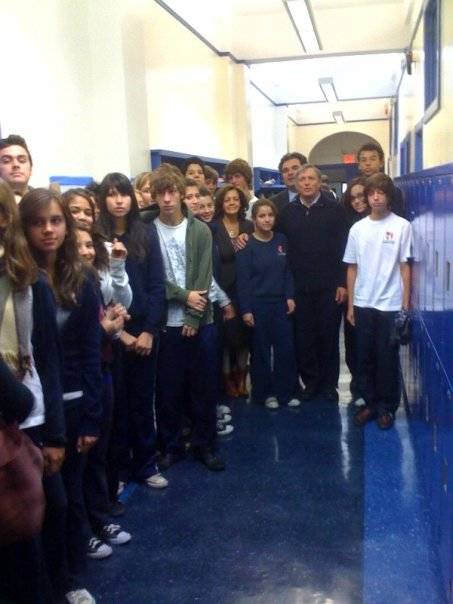

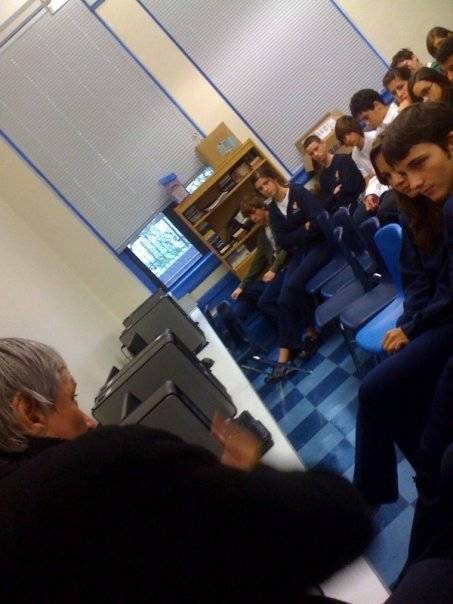

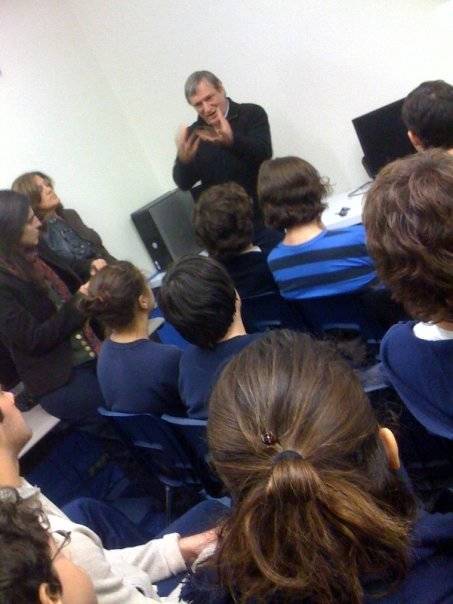
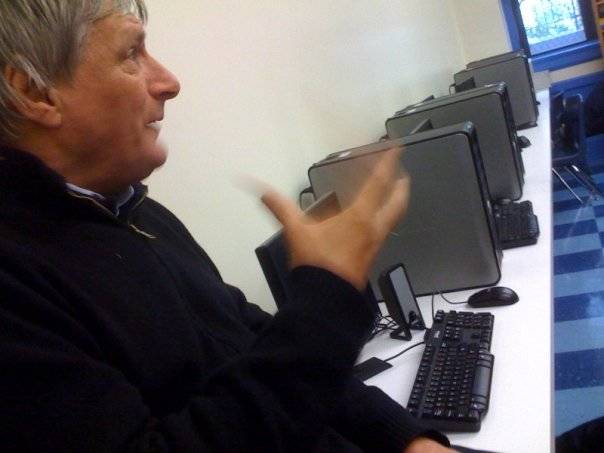
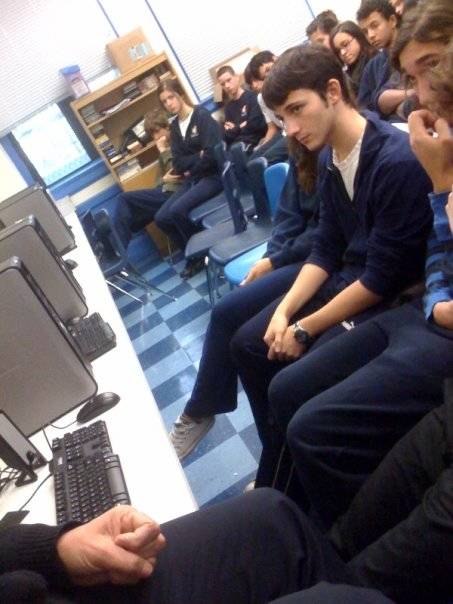

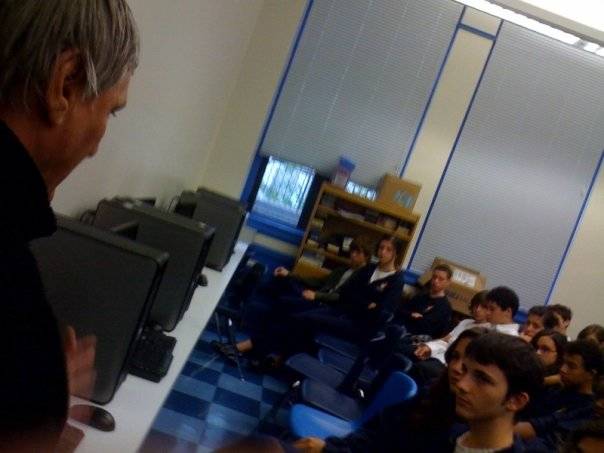
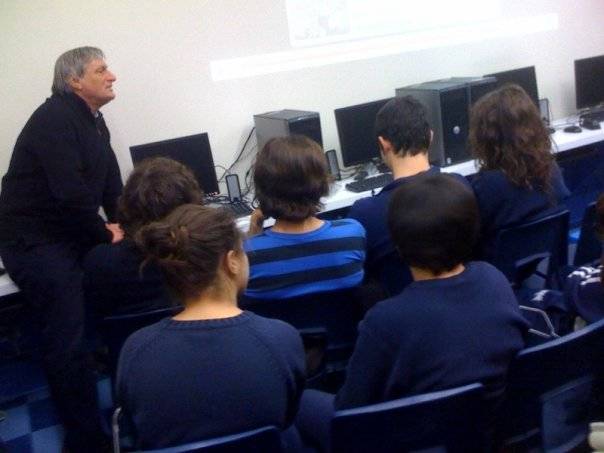
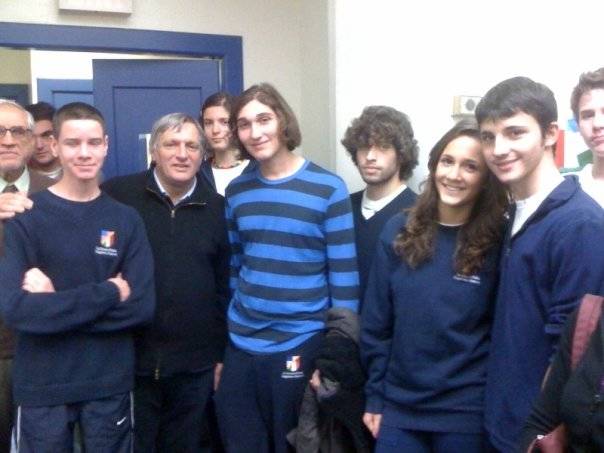



i-Italy
Facebook
Google+
This work may not be reproduced, in whole or in part, without prior written permission.
Questo lavoro non può essere riprodotto, in tutto o in parte, senza permesso scritto.